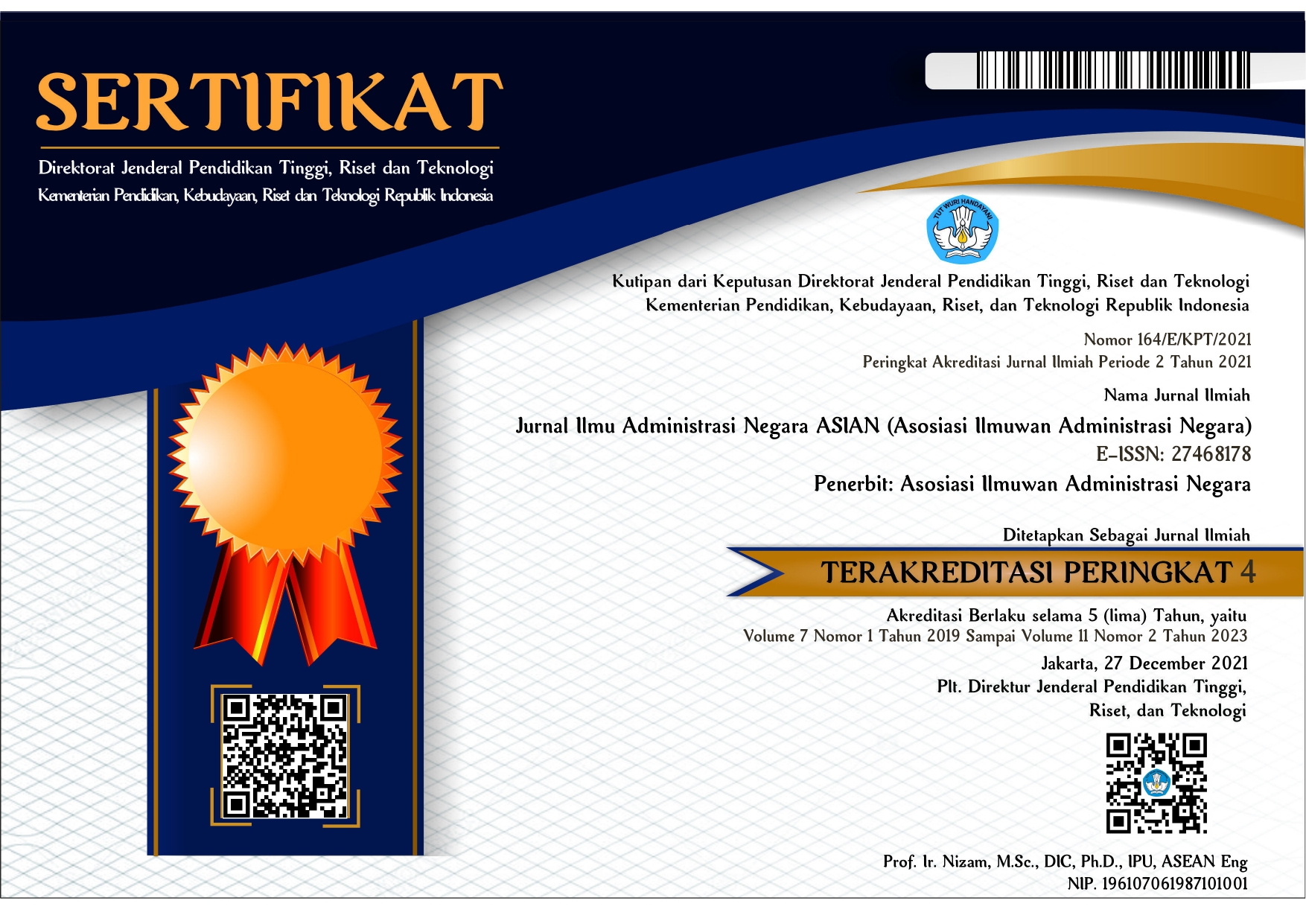Assessing Accountability in BPJS Services at Ciamis District Hospital, West Java: A Critical Analysis
 Abstract views: 564
,
Abstract views: 564
,
 PDF downloads: 347
PDF downloads: 347
Abstract
This research investigates the dimensions of public accountability related to the services of the Social Security Administering Agency (BPJS) at the Ciamis District Hospital, West Java, by applying a descriptive qualitative approach and desk study methods. Then, data was collected through news sources and related documents to understand the context of BPJS health services from the government and community perspective. The research results highlight non-optimal accountability in health services as the main problem, which requires strengthening the controlling function by RSUD through steps such as audits and inspections to ensure compliance with service standards. Then, efforts to increase transparency and community participation are also considered fundamental by taking initiatives to socialize participants' rights and obligations and establishing participation forums. Finally, government firmness is needed in determining sanctions and incentives for RSUDs that do not comply with regulations by ensuring strict supervision during the implementation of BPJS services. In conclusion, this research emphasizes the urgency of understanding public accountability in the BPJS health service dimension, with an emphasis on the role of the government and the Ciamis District Hospital in the perspective of vertical and horizontal accountability.
Downloads
References
Afiyah, N., & Ayuningtyas, D. (2023). Factors Influencing The Implementation Of Health Service Quality Governance In Puskesmas: Systematic Review. Asian Journal of Healthy and Science, 2(3), 130–147.
BBC, N. (2023). Perlakuan diskriminasi apa saja yang terjadi? Retrieved from https://www.bbc.com/indonesia/articles/cn06g268n6vo
Bovaird, T., & Löffler, E. (2023). The changing context of public policy. In Public management and governance (pp. 14–26). Routledge.
Hasnida, A., Kok, M. O., & Pisani, E. (2021). Challenges in maintaining medicine quality while aiming for universal health coverage: a qualitative analysis from Indonesia. BMJ Global Health, 6(Suppl 3), e003663.
Hennink, M., Hutter, I., & Bailey, A. (2020). Qualitative research methods. Sage.
Hildreth, W. B., Miller, G., Rabin, J., & Hildreth, W. B. (2021). Handbook of public administration (Vol. 1). Routledge.
Khotami, M. (2017). The concept of accountability in good governance. International Conference on Democracy, Accountability and Governance (ICODAG 2017), 30–33. Atlantis Press.
Osborne, S. (2020). Public service logic: Creating value for public service users, citizens, and society through public service delivery. Routledge.
Pinori, J., Sumakul, T., Pinangkaan, N., Watulingas, R., & Midu, S. (2023). Dispute Resolution of State Auxiliary Institutions in Indonesia: Comparative Study in Several Countries. JL Pol’y & Globalization, 134, 62.
Pourat, N., Lu, C., Huerta, D. M., Hair, B. Y., Hoang, H., & Sripipatana, A. (2023). A systematic literature review of health center efforts to address social determinants of health. Medical Care Research and Review, 80(3), 255–265.
Quinn, N., Bromage, B., & Rowe, M. (2020). Collective citizenship: From citizenship and mental health to citizenship and solidarity. Social Policy & Administration, 54(3), 361–374.
Republik Indonesia. Permenkes No. 33 Tentang Standar Tarif Pelayanan Kesehatan Dalam Penyelenggaraan Program Jaminan Kesehatan. , (2023). Indonesia.
Wibawa, S., Rosyadi, S., & Zulmasyhur. (2021). Pengantar Manajemen Publik (1st ed.; S. Wibawa, S. Rosyadi, & Zulmasyhur, Eds.). Depok: CV. Khalifa Mediatama. Retrieved from http://digitallib.pps.unj.ac.id/index.php?p=show_detail&id=94775
Yadav, D. (2022). Criteria for good qualitative research: A comprehensive review. The Asia-Pacific Education Researcher, 31(6), 679–689.
Copyright (c) 2024 Jurnal Ilmu Administrasi Negara ASIAN (Asosiasi Ilmuwan Administrasi Negara)

This work is licensed under a Creative Commons Attribution-ShareAlike 4.0 International License.
Authors who publish with this journal agree to the following terms:
1. Copyright on any article is retained by the author(s).
2. The author grants the journal, right of first publication with the work simultaneously licensed under a Creative Commons Attribution License that allows others to share the work with an acknowledgment of the work’s authorship and initial publication in this journal.
3. Authors are able to enter into separate, additional contractual arrangements for the non-exclusive distribution of the journal’s published version of the work (e.g., post it to an institutional repository or publish it in a book), with an acknowledgment of its initial publication in this journal.
4. Authors are permitted and encouraged to post their work online (e.g., in institutional repositories or on their website) prior to and during the submission process, as it can lead to productive exchanges, as well as earlier and greater citation of published work.
5. The article and any associated published material is distributed under the Creative Commons Attribution-ShareAlike 4.0 International License








